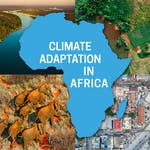Climate Adaptation in Africa

- Level: Introductory
- Time commitment:19 hours
- Learning product: Online course (MOOC)
- Sector:Multi-sector
- Location: Africa
- Language:English (subtitles in English only)
- Certificate available:from Coursera
Introduction
This course explores why climate change adaptation is important in the African context. Africa is considered one to be one of the most vulnerable regions to climate change. Historically, climate-related hazards such as drought, flooding, pest and disease outbreaks, coastal storms and heat waves have had devastating impacts on people and the environment in which they live. Often the damage knocks back progress that has been made in social and economic development, slowing down the achievement of development goals. Climate models suggest that many of these climatic hazards will intensify as the global climate warms. Building resilience to climate risks, through adaptation, is critically important for future development in Africa.
Go to Climate Change in Africa MOOC
Above is a direct link to the Coursera course. A description of 4 weeks of videos, readings and quizzes is given below. These can be accessed at any time without enrolling on Coursera.
Institutional Background and Trainer
Trainer: Mark New is Pro-Vice Chancellor for Climate Change and Director of the African Climate and Development Initiative (ACDI).
Institution: The University of Cape Town is the oldest university in South Africa and is one of the leading research universities on the African continent with the aim of ensuring that their research contributes to the public good through sharing knowledge for the benefit of society
Who would find this useful?
The course is designed for participants who:
- Wish to explore an overview of climate change adaptation in the African context.
- Are new to climate change adaptation and/or adaptation in theory and in practice, with focus on four sectors important for climate-resilient development in Africa: Water Security (Week 2), Agriculture and Food Security (Week 3), Ecosystems and Ecosystem Services (Week 4), and Resilient Cities (Week 5).
- Want to learn how to make adaptation plans, from identifying adaptation options to implementing strategies, learning from key examples (Week 6).
Training Material
Week 1: Climate, Vulnerability and Development in Africa
We start by exploring the linkages between social and economic development in Africa and climate change. We look at the anticipated changes in the future climate of the region and how this could impact on the development trajectory. I cover both contemporary climate risks and future climate change and how those interact with development. I also introduce the key concepts around climate adaptation that this course in based on.
Welcome to the course(15 videos (Total 92 min), 4 readings, 3 quizzes)
Week 2: Water Security
We’ll start by examining the nature of risks to water security and the approaches to adaptation to changes in water supply – whether it is dealing with greater scarcity or more extreme weather events such as flooding. Water security is a key factor in social and economic development. Responding involves investigating climate adaptation strategies, especially at a regional level, not just at a global scale. The cases this week, presented by experts working on water security issues, are from Lesotho and South Africa.
Water Shortages as an Adaptation Challenge(13 videos (Total 76 min), 2 readings, 3 quizzes)
Week 3: Agriculture and Food SecurityWe’ll start off by looking at the nature of agriculture across regions in Africa and the current situation of food security. Eradicating poverty through creating food security is a key sustainable development goal. We will analyze food security in terms of availability, access and utilisation – and how each of these aspects can be affected by climate change. I’ll be providing some information about the projected impacts of climate change on agriculture before moving onto look at adaptive strategies. The cases this week offer a rich variety of contextual examples from smart agriculture in Mauritius to changes being made by Namibian livestock farmers.
Food Security in Africa(14 videos (Total 99 min), 2 readings, 3 quizzes)
Week 4: Ecosystems and Ecosystem Services
This week we’ll examine the mechanisms which make ecosystems vulnerable to climate change and other human-driven impacts. Ecosystems and the services they provide play a significant role in the livelihoods of people living across Africa. We will also look at the observed and projected impacts of the changing climate. We look at adaptation strategies from Tanzania as cases that illustrate some of the important issues.
Introduction to Ecosytems (11 videos (Total 95 min), 2 readings, 3 quizzes)
Go to Climate Change in Africa MOOC
for full overview of the course.
Learning Outcomes
- Understand Africa`s current and future challenges related to climate change and what action is possible in the African context.
- Receive a comprehensive introduction to the current and potential long-term effects of climate change on the socio-economic well-being of the African continent
- Learn about climate change impacts on the environment, but also how to mitigate risks related to climate change and how to adapt to those risks.
- Understand how to take action on climate adaptation in Africa with a clear understanding of how to choose and implement the best option.
African Climate and Development Initiative (ACDI) – a university-wide initiative at the University of Cape Town which supports collaborative research and training in climate change and development. Subscribe to the ACDI newsletter
(0) Comments
There is no content